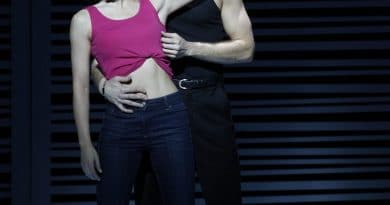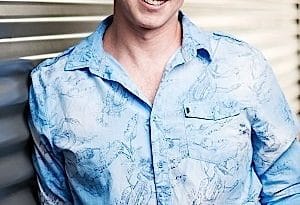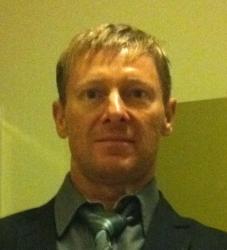Falstaff – Opera Australia
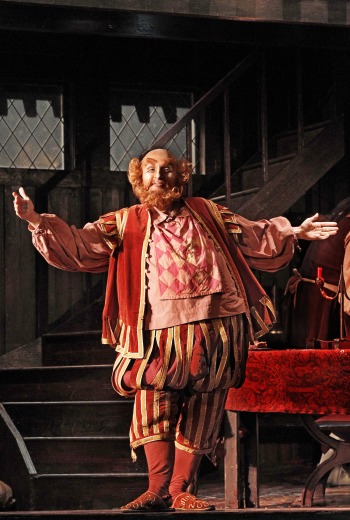
Closing Opera Australia’s 2014 season in Melbourne, Falstaff succeeds as the most intelligently integrated production of the year. As well as showcasing a large cast of Australasian principals led by Warwick Fyfe, who rollicks about while resembling an exotic, animated tropical fruit as the curiously cod-pieced but well-sung knight Sir John Falstaff, Giuseppe Verdi’s last opera is sheer comic pandemonium. Directed by Simon Phillips and first performed at the Adelaide Festival Theatre in 1995, it remains fresh and exhilarating under revival director Hugh Halliday’s grip.
Minus an overture and plunging explosively into the action at the Garter Inn in Windsor during the reign of King Henry IV (1399-1413), you might initially struggle to keep up with Falstaff’s opening moments but it doesn’t take long to fall under its spell. You might even forget both that it’s sung in Italian and to read the surtitles. Time is sped up with fast-paced and often unfathomable conversational exchanges, but the action and music seamlessly ‘talk’ you through with its ever-accessible storytelling. Conducting Orchestra Victoria to delightful results, Christian Badea keeps the musical cartwheel turning with lubricated ease and its three acts and its three hours (including two intervals) feels surprisingly much shorter.
A character appearing in three of William Shakespeare’s works (though not quite the years of the near 80 year-old Verdi when the opera premiered at La Scala in 1893), the ageing, plump, cock-sure, dishonourable, drunken and womanising Falstaff garners no support from his questionable friends, neighbours and the audience as he plots to seduce two of the the town’s married women, Meg Page and Alice Ford. What ensues is a parallel counterplot by the male and female folk to humiliate and teach the monster of fat a lesson. It is only in Act III when Falstaff counts out each chime of the town clock before his final humiliation that momentum slows briefly and precipitates compassionate thoughts for Falstaff. Ever the Teflon-coated personality that he is, however, Falstaff comes out victorious as he acknowledges his indignities, then quips with how his own wit inspires the wit in others.
The performance unfolds with scorching momentum as if the action is grafted to every one of Verdi’s potpourri of delicious notes and Iain Aitken’s intriguing set. The story’s characters move about in gloriously inspired mechanical motions within and around a two-storey, multi-gabled, open-roomed, boxed set of period rusticity, tantalisingly lit by lighting designer Nick Schlieper’s colour-themed palette to match the mood of each scene. From the inn to the market place, inside Ford’s house, then to the jetty behind the Garter Inn and finally to Windsor Park, together with Tracy Grant Lord’s gorgeously vibrant and detailed period costumes, this Falstaff is a model of triumphant staging.
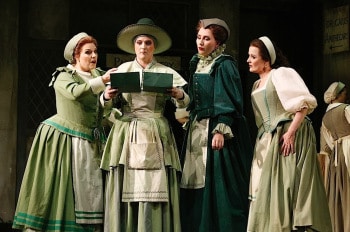
After the mesmerisingly dramatic portrayal opening the year in Melbourne of another of Verdi’s scheming protagonists, Rigoletto, Warwick Fyfe handles the demands of his bulbous costume to fulfil Falstaff’s role with intense engagement. While gesticulating to comic heights, Fyfe’s clean, rich baritone instills Falstaff with youthful hopes, cowardice and wit but there are times when more feels required of the protagonist to broaden and power the voice beyond the high level of singing on display.
Noteworthy performances come from Michael Honeyman in impressive, confident form as Ford and Dominica Matthews as Mistress Quickly as they bewilder and dazzle in disguised trickery. Joining them is the bubbly, glassy-edged vocal brightness of Taryn Fieberg as Nannetta and the sharp-shooting vocal roundness of Jonathan Abernethy as her amorous marriage prospect, Fenton.
Jane Ede as Ford’s wife, Alice and Jacqueline Dark as Meg Page scurry about with the merry wives in vocal and blissful agility and Graeme McFarlane is convincing as the robbed and angry Dr Caius. Falstaff’s cheating henchmen, Bardolph (Kanen Breen) and Pistol (Jud Arthur) heighten hilarities as they pep events with slapstick antics and, as a trio with Falstaff, the Three Stooges seem endearingly reborn. And as the townsfolk of Windsor, then down on their knees as exquisitely garbed and voiced tubby, midget fairies and demons in Act III, the Opera Australia Chorus finish the year in glittering form.
Conceived without stand and deliver show-stopping arias, Falstaff’s dramatic and musical acrobats, the pitter-patter and the chitter-chatter between the stage and the pit and a clever director’s hand all make for a fortuitous encounter with Shakespeare’s Falstaff, one could say, the Bard’s lard. Here, honour is but a word while the cure of comedy is heard.


